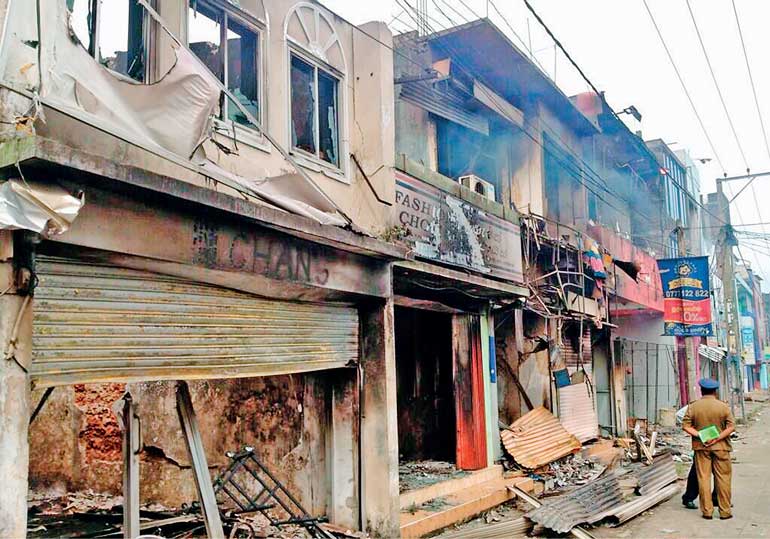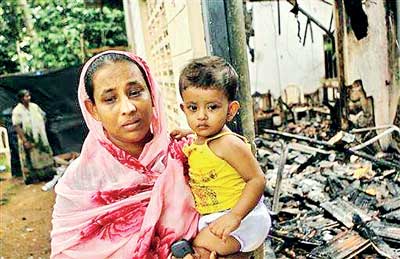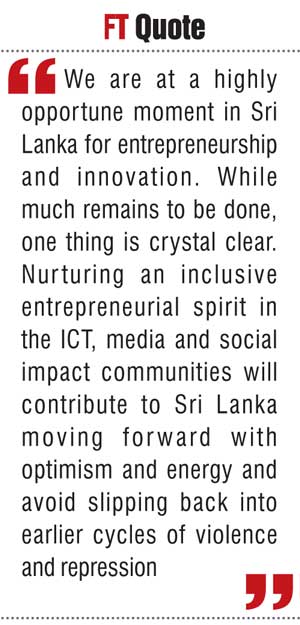Thursday Feb 19, 2026
Thursday Feb 19, 2026
Wednesday, 10 August 2016 00:02 - - {{hitsCtrl.values.hits}}

Given an emerging and often virulent nationalism that is tinged with ethnic hatred, it is critical to intervene quickly, offering more moderate alternatives and a message of national pride based on a Sri Lanka for all. It is critical now to build strong online communities dedicated to a peaceful and tolerant future for Sri Lanka. These communities will grow in part from, and will rely on, the energy of the young men and women streaming into Sri Lanka’s robust startup scene
By Sam de Silva
These are heady days in the Sri Lankan startup community, with a buzz of excitement and new startups appearing monthly. The development talent is here, with thousands of able and eager developers graduating every year from hundreds of technical institutes scattered throughout the country.
The demand for services is also growing quickly. This island nation of 21 million has a literacy rate of 92% and 110% mobile phone penetration. 72% of mobile phone users access the internet through their devices. Social media penetration hovers near 60% in the  influential 18-24 age group, and many in this demographic report it is highly influential both online and offline in their communities.
influential 18-24 age group, and many in this demographic report it is highly influential both online and offline in their communities.
These are also exciting times in the social change community. With the election of President Maithripala Sirisena in January of 2015 and a Coalition Government led by the President and Prime Minister Ranil Wickremesinghe, Sri Lanka is undergoing a powerful shift toward more democratic and open government.
This new Government is overseeing the drafting of a new constitution. After more than 10 years of debate, the Parliament has passed the Right to Information law. And Sri Lanka has signed on to a transitional justice agenda that includes a peace and reconciliation process to heal the deep wounds inflicted in the decades long civil war, which ended in 2009.
These two trajectories – a vibrant, emerging tech sector and a deep thirst for social progress, democracy and transparency – offer a powerful opportunity to establish Sri Lanka as a thought leader in South Asia for building an engaged and inclusive information environment.
Of course, for every light there is a shadow and Sri Lanka has its share of challenges and tensions, some simmering just below the surface, that need to be addressed and managed gracefully in order to fully take advantage of the opportunities in front of it.
The peace dividend could fall short
We are now just a year out from the ambitious first 100 days of the Sirisena presidency. Although the new Government remains genuinely committed to deep reforms, the list of to-do items and competing priorities is daunting. These priorities are being enacted in a context where 27 years of conflict and authoritarian rule have seriously eroded capacity within the Government. The other legs of the reform stool, civil society and the media, remain weak from their own long history of working under Government impunity and self-censorship.
On the citizen side, Sri Lanka remains a deeply-divided country. There are ethnic divides between the majority Sinhalese people and the minority Tamil speaking population, which includes the Muslim community and the ethnic Tamil community. The former live largely in the south and west and the latter in the north and east.
There are three distinct press corps – English, Sinhalese and Tamil – each with their own issues and conversations, and political agendas. In the wake of the conflict, many ethnic and religious tensions remain, with eruptions of hate speech becoming increasingly common. Add to all of this a massive Government debt that even the most rigorous and aggressive fiscal policy won’t  clear, and you have a serious set of challenges and a small window of opportunity to demonstrate progress.
clear, and you have a serious set of challenges and a small window of opportunity to demonstrate progress.
Sanjana Hattotuwa, Head of the Media Unit at the Centre for Policy Alternatives in Colombo, warns, “The Government has a real challenge communicating what it is doing and why, across the board. The danger here is that systematic change takes time, as we know. If you don’t set expectations accordingly with an anxious public, you risk at best apathy and at worst, violence. In Sri Lanka, that can tilt the balance back in favor of those no longer in power. Those elements could raise their head again and that leads to a very dystopic future.”
Communications and information are critical to the success of this new Government, particularly with the two massive undertakings of building a new constitution and taking the country through a reconciliation process. The Government must have a clear and comprehensible agenda for both and media and civil society must do their part to communicate these to an increasingly restive public. If done reasonably well, the new constitution and the transitional justice processes will lay the groundwork for a strong and unified Sri Lanka, where the distinctions between Sinhalese and Tamil no longer drive the public dialogue. It is in this context that participatory democracy can bloom.
Every indicator, from Facebook penetration to mobile phone usage to media consumption, indicates that Sri Lanka should be what Hattotuwa calls “a communications paradise” for these issues. Instead, what he and other media observers have seen is that new technology more often than not follows the same pattern as the old media – dividing people into ethnic and caste-based echo chambers.
“I have been as frustrated by civil society as by Government in term of effective communications,” said Hattotuwa. “If you take the analogy of a Sri Lankan village, all of which have a tea shop and a well where people gather together to discuss and debate the issues that matter to them. We have been unable to figure out the digital equivalent to the village well and the tea shop.”
What’s boiling under the surface
In a recent study for CPA about the growing levels of online hate speech on Facebook in Sri Lanka, co-authored with Shilpa Samaratunge, Hattotuwa writes, “When juxtaposed with the increasing violence against sexual, ethnic and religious minorities and the open celebration of hate speech… content online risks fanning even greater violence in the future. Even if to date there is little evidence of content online leading to actual physical violence, what is particularly disturbing – given the tens of thousands who are actively producing and engaging with hate speech – is the radicalisation of youth, as young as 18, to an alarming degree. Though discussions and content are respectively conducted and produced in public fora over platforms like Facebook, the scale and degree of this radicalisation remains ironically hidden to politicians, policymakers and even most parents because of a digital media literacy gap.”
“The extreme anti-Muslim and LGBT hate in this country has largely gone under the radar because it is in Sinhala. It is very difficult for Facebook to monitor, so these sites stay up,” adds Hattotuwa.
He went on to offer another recent example. Sinhalay, a group whose name means both “the lion race” and the “blood of the  Sinhala”, orchestrated a sophisticated online and offline campaign that spread quickly throughout the country. They created a sticker that could be affixed to one’s Facebook profile as well as physical stickers that were posted on cars, buses and shop fronts. While the intentions behind the campaign were rabidly nationalist and anti-Muslim, many people adopted it, thinking that it was simply a sign of patriotism.
Sinhala”, orchestrated a sophisticated online and offline campaign that spread quickly throughout the country. They created a sticker that could be affixed to one’s Facebook profile as well as physical stickers that were posted on cars, buses and shop fronts. While the intentions behind the campaign were rabidly nationalist and anti-Muslim, many people adopted it, thinking that it was simply a sign of patriotism.
“Within the physical and Facebook pages that are anchored to this campaign, if you go through the posts and the comments to the posts, you will find the same Islamophobia that you found two years ago. But the intention was not overtly anti-Muslim, it was pro-nationalism. There was some defacement of Muslim homes. In essence, campaigns like this offer a flashpoint and stir up latent hate,” Hattotuwa explained.
Given an emerging and often virulent nationalism that is tinged with ethnic hatred, it is critical to intervene quickly, offering more moderate alternatives and a message of national pride based on a Sri Lanka for all. It is critical now to build strong online communities dedicated to a peaceful and tolerant future for Sri Lanka. These communities will grow in part from, and will rely on, the energy of the young men and women streaming into Sri Lanka’s robust startup scene.
Creating the village well through civic entrepreneurs
In August of last year, Internews hosted Sri Lanka’s first social good hackathon, Code4Good. It was a real success, attracting 150 enthusiastic young developers. We based the model on a number of other hackathons we have done throughout Asia, fine tuning the process for the needs of Sri Lanka. The ultimate goal was to begin to build community between the media, developers, entrepreneurs and civil society.
We started by inviting Civil Society Organisations (CSOs) to pitch their challenges to the developers and entrepreneurs the Friday before the hackathon. For example, one organisation talked about how women have a hard time when they go to report domestic violence at police stations. Another talked about the challenges around hate speech. These issues were pitched as problem statements. Then we gave time for the developers to go around and speak to the organisations and decide which problem they wanted to work on. In the intervening week, many of them took further meetings with the CSO and learned more.
The hack itself was 56 hours and many CSO members stayed throughout. Friday night kicked the event off with a Facebook-sponsored dinner where the developers learned about Facebook tools for their development. We then had the teams introduce themselves and the teams and they started to work. Most developers coded throughout, and many CSO members were present during the day time.
At the final demo day, 19 technology-infused solutions were pitched. We selected the top six to enter a six week incubation process where they got one on one mentoring. Some of the solutions included a platform to connect citizens with parliamentarians, and a collaborative story telling app.
As exciting as many of these solutions are, Internews’ deeper goal in this first hackathon was to demystify technology for the CSO community and to expose these young developers to social issues for which they were unaware.
A lot of the young developers and entrepreneurs in the ICT community have a deep interest in the country not going back into a state of conflict. At the same, there is within the IT community a lot of naiveté about many of the worst practices of the former Rajapaksa regime. The severe limits on civil rights, the corruption and the impunity toward the media are not well understood in this community. Many of them simply see former President Rajapaksa as a nationalist hero for ending the war and this group is susceptible to nationalist-driven hate speech.
This is not a blanket statement about the ICT community. There is another, progressive element who want to make a social contribution and understand the need to collaborate across ethnic and language boundaries. This faction also understands that a unified Sri Lanka is a healthier and more robust market for their products. In many ways, our work is about bringing all of these groups together to learn from each other, exposing them to other points of view and social issues, so they can develop a more informed point of view.
Building a civic technology hub
Sri Lanka is buzzing with meetups and private-sector hackathons and trainings. The interest in building skills is there. There is also a deep interest in securing the future of Sri Lanka at this transitional moment. As one of our mentors for the Code4Good program, Fayaz Hudah commented, “Money is not the driving force for many entrepreneurs in Sri Lanka. They are interested in building businesses based on community.”
We feel that the time is ripe to build a community hub devoted to technology for social good in Sri Lanka. This hub would offer a fixed point for events and development at the intersection of community, technology, media and social impact. In this space, we would offer a co-working environment as well as host events on topics of interest to the blended community.
We would also offer more social good hackathons, building on the energy and success of the first one. We would select the top teams from each hackathon and offer them four to six months of funding and work space to incubate their work. At the same time, we would continue to offer events on topics such as mapping, data for development, design thinking, gamification and many other topics of interest to both the ICT and the social change communities. Although this vision is not necessarily unique, it is one whose time has come in Sri Lanka and would help the civic technology ecosystem to blossom.
We are at a highly opportune moment in Sri Lanka for entrepreneurship and innovation. While much remains to be done, one thing is crystal clear. Nurturing an inclusive entrepreneurial spirit in the ICT, media and social impact communities will contribute to Sri Lanka moving forward with optimism and energy and avoid slipping back into earlier cycles of violence and repression.
(The writer is Country Director of Internews Sri Lanka.)